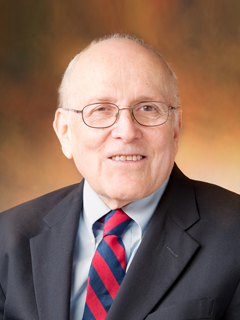HOW CAN WE HELP YOU? Call 1-800-TRY-CHOP
In This Section

Dr. Douglas has extensive laboratory experience investigating the cellular immunology of HIV/AIDS, primary immune deficiency diseases, and cellular immunopathologies. In addition, he has had significant involvement in studies related to immunological interactions.
Bio
The research interests of Dr. Douglas Dr. focus on the cellular immunology of HIV/AIDS, primary immune deficiency diseases, and cellular immunopathologies. In addition, he has had significant involvement in studies related to immunological interactions.
He is a core director in the NIMH-funded Penn Mental Health AIDS Research Center, and the PI for laboratory biomarkers quantitative pharmacology neuroimaging and neurobehavioral characterization core.
Dr. Douglas, the author/coauthor of over 500 peer-reviewed publications, has a robust research program that has led to numerous scientific contributions to his field. He discovered that human lymphocytes pokeweed mitogen differentiated into plasma cells and delineated the immune function of human lymphocytes and lymphocyte function in primary immune deficiency diseases. He observed that human lymphocytes of the T cell subset formed unique rosettes with sheep erythrocytes, a marker for these lymphocytes. His studies demonstrated that lymphocyte responses were impaired in primary immune deficiency, and this technique was used to identify disorders of lymphocytes.
In addition, Dr. Douglas was first to isolate and culture human monocytes from peripheral blood, enabling the discovery and technology to study monocyte receptors for immunoglobulin and complement, as well as disorders of monocyte in long-term culture.
He discovered human monocyte macrophage and lymphocytes receptors for substance P; was the first to show that macrophages were infected with HIV; and discovered that there are abnormalities in macrophage immunity, and cells can be manipulated by drugs that affect both the brain and the immune system.
Dr. Douglas has also contributed scientific knowledge on the effects and design of new therapeutics for HIV, using antagonist Neurokinin-1. He discovered that substance P antagonists inhibit HIV through its physiologic receptor NK1R, and demonstrated that treatment with substance P antagonists leads to decreased inflammation in some patients infected with HIV.
Education and Training
AB, Cornell University (Zoology), 1959
MD, Cornell University, 1963
Fellowship, University of California, San Francisco (Immunology), 1969
Titles and Academic Titles
Section Chief for Immunology
Medical Director, Immunogenetics Laboratory
Professor of Pediatrics
Professional Memberships
American Academy of Microbiology, Fellow
American Association of Immunologists
American Federation for Clinical Research
American Society for Clinical Investigation
American Society for Microbiology
American Pediatric Society/Society for Pediatric Research
Association of Medical Laboratory Immunologists, Fellow
Interurban Clinical Club
Society for Leukocyte Biology
Henry Kunkel Society
Professional Awards
American Society for Microbiology/Abbott Laboratories Award in Clinical & Diagnostic Immunology, 1997
Erwin Neter Award, Assn. of Medical Laboratory Immunologists, 2000
Honorary Life Member, Society for Leukocyte Biology, 2000
American Association for the Advancement of Science, Fellow, 2003
Paradigm Builder Award of the International Society for Neurovirolgy, 2015